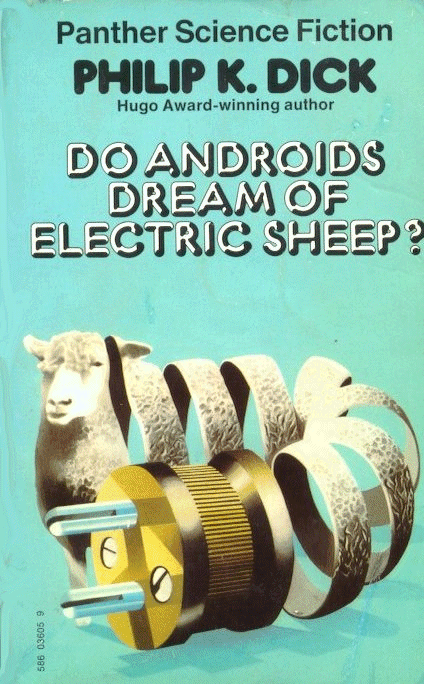
Please note that this is a draft of an article that will see final publication on this site. If you have any thoughts that might help this article in any way, please write me.

Please note that this is a draft of an article that will see final publication on this site. If you have any thoughts that might help this article in any way, please write me.
Ever have a moment when reality seems to shift around you? Ever feel like you don't know who you really are? Or find objects suddenly devolving into older versions of themselves? Or find yourself involved with a schizophrenic child who can see the future? Or involved with a child who might be the Messiah? If you were a character in a novel by Philip K. Dick (and how can you say you're not!?), these and other bizarre events could happen to you at any time, for arbitrary and capricious reasons, or for no reason at all.

These, and many, many more astonishing moments, take place in the odd, wild, disturbing and bizarre world of the fiction of Philip K. Dick. Few writers can match Dick for the sheer strangeness of the concepts he presented in his novels; it is hard to think of a writer who would dare to create a novel about a police officer assigned to spy on a drug dealer, have the drug dealer be himself, and find that he indeed does deserve to be arrested! Nearly every one of Dick's 40 or so novels contains some scenes that would barely be imagined by other writers. These scenes are so unique and strange and compelling and interesting that they seem to come out of the mind of someone who is either a genius or a person with a massive drug problem, or both.
Dick's characters inhabit unique settings - Mars, the moon, a strangely transformed earth, a place where the Nazis and Japanese won World War II, even 1950s California -however, what shines through most strongly in Dick's novels is not the odd settings or bizarre plots. The most important thing to Dick in his fiction is the reaction of his characters to the befuddling events that happen to them. Dick's writing shines with compassion for his characters. He seems to empathize strongly with the confused and frustrated people who populate many of his novels. His characters seem believable because they do not simply live on the surface; nearly all his major characters have complex inner lives, unique belief systems, neuroses, passions, pride and all the other unpredictable trappings that make a human being.
A perfect example of the complex inner lives Dick gives his characters lies in one of his finest novels, Do Androids Dream of Electronic Sheep. The protagonist, Rick Deckard, is a bounty hunter employed by the San Francisco Police Department. In a bizarre post-apocalyptic environment, Deckard is given the assignment to track down robot slaves from Mars who are trying to live on Earth. This simple sketch makes the book sound like stereotypically silly science fiction. In fact, this one small slice of the novel's plot was filmed as the wonderful film Blade Runner. However, in Do Androids Dream of Electronic Sheep, however, Dick presents Deckard with much deeper and more universal concerns than just his job.
Deckard inhabits a three-dimensional world. He does more with his live than simply fight crime. Deckard is married to a woman who cannot feel emotions without the aid of her "Penfield mood organ." Deckard and his wife, along with most of the people left on a radioactive Earth, follow an odd pseudo-religion called Mercerism in which a believer connects, through the device of an "empathy box," to a dusty hill where they can literally feel the pain of an old man who is being pummeled by rocks. He lives in a society where personal prestige is determined in part by whether they own any extraordinarily scarce animals.
Deckard continually dreams of buying a real animal of his own as a symbol of his status in his society. In fact, Deckard's whole sense of self-esteem is tied up in his aspiration to purchase a real sheep to replace his continually malfunctioning electric sheep. Deckard's world is a satire of middle-class life in America in the 1960s. Dick is holding up a funhouse mirror to the suburban post-war ambitions and finding them devoid of true meaning. Deckard's ardent and compulsive pursuit of a real animal satirizes the archetypal middle-class striving for status as an end to itself. Deckard truly believes that he will be much happier if he is able to acquire the object he lusts after. However, when he does actually buy his sheep, Deckard is left with an aimless feeling. The animal dies almost immediately after he acquires it, and Deckard is left with nothing for all his struggles. Dick is implying that many of our middle-class dreams are ultimately self-defeating because what we think will make us truly happy only grants us transient happiness. It's the striving, not the achieving, that is the real power.
This description makes Dick's the novel sound very heavy and serious, but Dick writes with such a sense of fun that the book is terrifically entertaining, It is hard to not be sucked into the odd world he creates. Dick never loses sight of the very real-seeming ambitions and goals of Deckard; he never turns Deckard into a caricature. He is a real person with real goals and fears.
There is one other important aspect of this book, and element that appears in most if not all of his novels: the idea of dislocation, of suddenly feeling the ground shift under your feet and be told, or suddenly know, that you are not who you think you are. Or that the world around you is not what it seems to be. In the midst of pursuing one replicant as a member of the San Francisco Police Department, Deckard suddenly is arrested himself, by an alternate SFPD that insists that not only is he not on their payroll, but that his whole m joke. The first time I encountered this section of the book, my jaw dropped in shock. What the hell was this? Suddenly it seems the reader has been lied to for a hundred pages. Suddenly it seems Deckard is not the man we think he is. Is he really the replicant? Is he some kind of madman pursuing some insane delusional story? The alternate police try to persuade Deckard that he is crazy, but he sees through the ruse.
I won't ruin the twist by dwelling on it here. The scene is baffling but exhilarating. It is also typical of Dick's novels. Almost all of them have a scene of personal dislocation, of a moment where reality seems to shift somehow without characters realizing it. Whether it is Mr. Tagomi seeing an alternative reality in The Man in the High Castle, or the four simultaneous yet different views of a confrontational moment in Martian Time-Slip or the endlessly shifting plot of the Game-Players of Titan the bizarre twists of Ubik or Time Out of Joint. In a Dick novel, things are never quite what they seem to be.

Added to that is the fact that many of Dick's characters seem to be wrestling with mental illness. Characters in Martian Time-Slip a nd Confessions of a Crap Artist commit suicide, and characters in many other books consider it (in The Game Players of Titan is talked out of suicide by his talking mirror - a spectacularly Phildickian moment). The titular character in Dr. Bloodmoney is megalomaniacal and believes himself to be the cause of worldwide thermonuclear war. And, in a spectacular twist, Dick implies that the character might be right! You can never be sure what exactly is real in a Dick novel. That is part of the beauty of his books.
Dick was a master of the rambling plot. His books seldom, if ever, follow a traditional novelistic structure. Some, like Mary and the Giant, seem to just ramble from one event to the next. Others, like The Game Players of Titan, take so many twists and turns that they are almost satires of traditional novels. Others, such as VALIS, seem to be more polemic than story. Structure in Dick's novels seems to depend completely on what goals he is trying to accomplish.
Even with all these complications, characters in Dick's novels often carry a certain amount of nobility, an everyman quality lacking in many books. His books have few if any truly evil characters - even the really nasty people like Hoppy Harrington in Dr. Bloodmoney are presented sympathetically in Dick's fiction.
I've only touched very lightly on the major themes of Dick's fiction. Few writers can match Dick in terms of his productivity, his breadth of subject matter, and for the challenging themes he presents. He can only be truly experienced by reading a range of his novels. There never has been anyone quite like him.